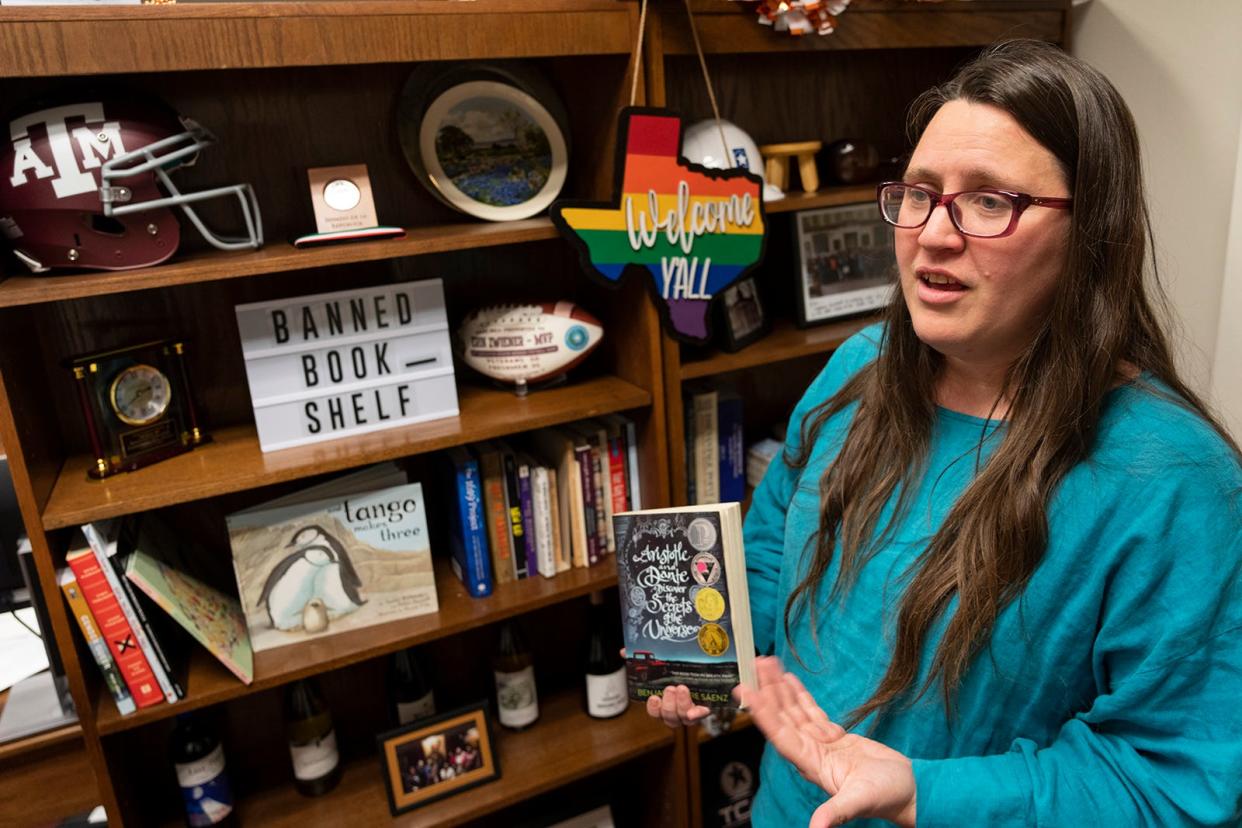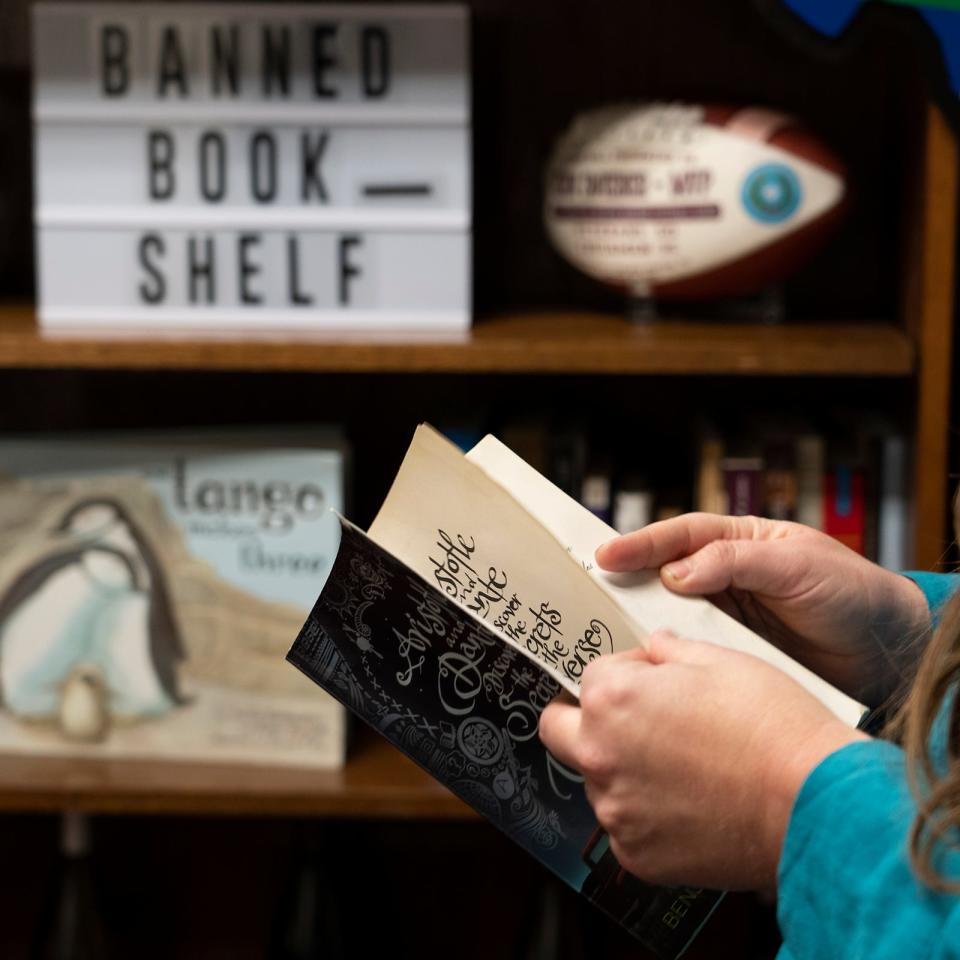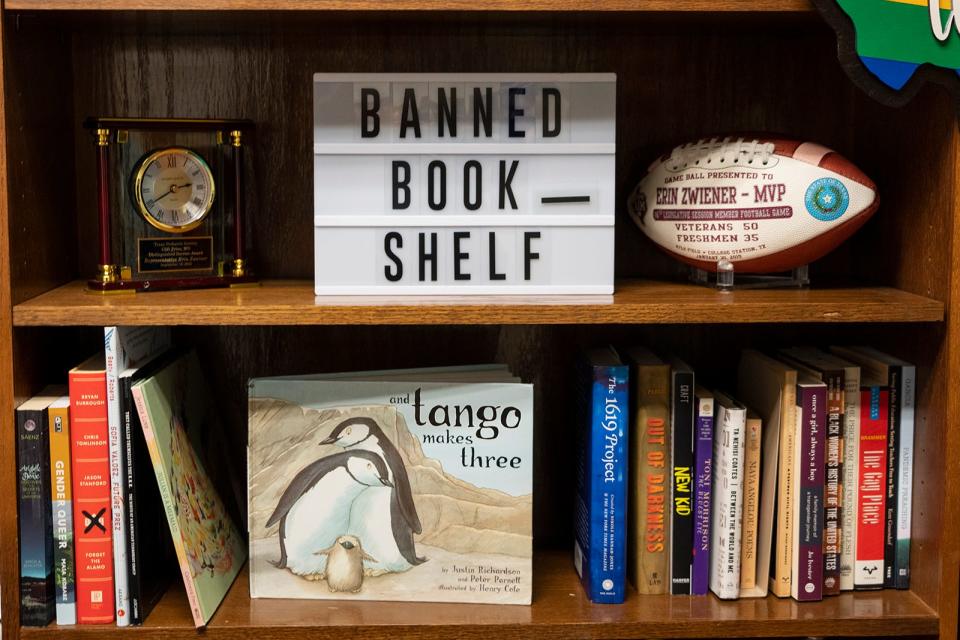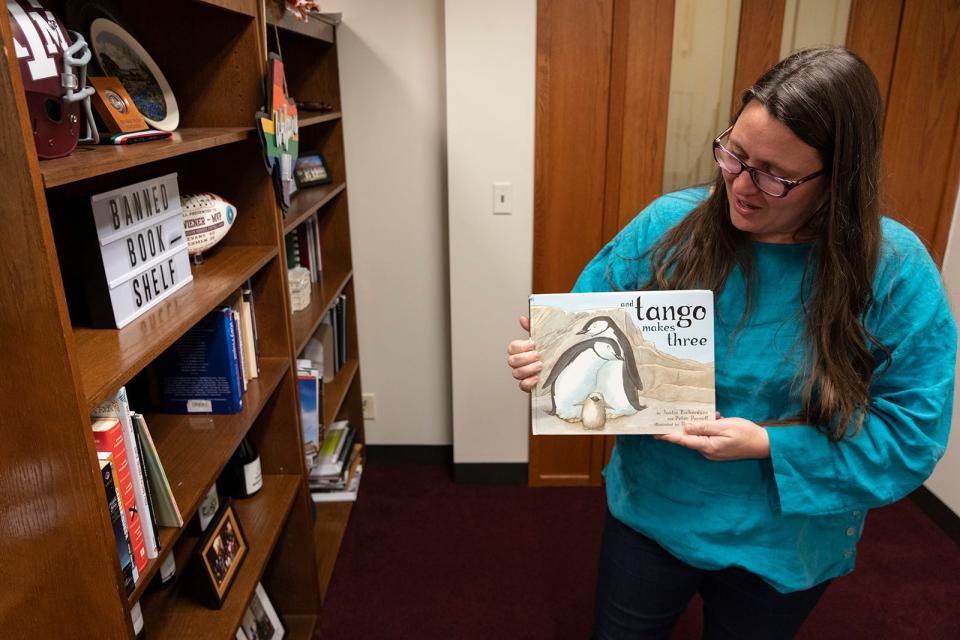Grumet: Tales from the Banned Book Shelf inside the Texas Capitol

It’s one of her 4-year-old daughter’s favorite books. Now the sweetly illustrated “And Tango Makes Three” is prominently displayed at state Rep. Erin Zwiener’s office at the Texas Capitol, underneath a sign that reads, “Banned Book Shelf.”
“This is one of the books I refer to a lot when people are like, ‘All of these books are just pornographic,’” Zwiener told me, referring to titles that have been yanked from library shelves or targeted at raucous school board meetings over the past few years.
“And I’m like: Two penguins lean their heads on each other. If someone is finding that pornographic, I have bigger concerns.”
“It’s two male penguins who raise a chick together from an egg,” the Hays County Democrat continued. “And it’s a true story.”
Zwiener’s Banned Book Shelf sits at two dozen titles and growing. When I caught up with her last week, she was adding “The 1619 Project” — a book about slavery and the African American experience that Texas law explicitly bans from any classroom curricula — as well as “Julián is a Mermaid,” a picture book about (gasp) a boy playing dress-up as a mythical sea creature, a plot that raised hackles from the Fort Worth suburbs to Victoria.

Zwiener started building her Banned Book Shelf this legislative session to draw attention to this perilous moment in Texas. Last school year, Texas led the nation with 801 book bans in 22 school districts, an astonishing march of censorship in a state where leaders claim to value “education freedom” and decry a climate of “cancel culture.”
The push continues. “Protecting children from obscene books in libraries” is one of Lt. Gov. Dan Patrick’s top legislative priorities this session, and lawmakers are filing bills to take even more ideas out of circulation.
Overwhelmingly, those ideas involve race, gender and sexuality.
To be clear, there have always been cases where parents were concerned about a particular book, and librarians welcome that discussion, helping people find the books that are right for them.

This moment is decidedly different, Shirley Robinson, executive director of the Texas Library Association, told me.
More than 50 groups have organized around the country to push for book bans, often in tandem with other political agendas related to school policies or vouchers. Some librarians face harassment on social media or pressure campaigns directed at their school district supervisors, Robinson said.
“It's a very dangerous moment for us when the government starts working with these types of groups to censor our freedoms and restrict our freedoms,” Robinson said. “Intellectual freedom, the First Amendment, is a foundational tenet of our democracy. So really, it's our democracy that's being challenged by these groups. And we absolutely need folks to wake up and ask questions.”
Most Texans oppose efforts to remove books from public school libraries. Only 36% supported such efforts, according to an April poll by the Texas Politics Project.
Still, Robinson is worried about the book-banning bills in the works. House Bill 1655 by Rep. Jared Patterson, R-Frisco, for instance, would establish ratings for books with sexual content. Any explicit content would be defined as pornography and banned from school libraries.
Meanwhile, Axios reported last week that an attorney has been drafting proposed ordinances for Texas cities that would allow people to sue librarians for content they find objectionable and collect a cash bounty. Sound familiar? The attorney reportedly working on this effort, Jonathan Mitchell, pioneered that legal strategy in Texas’ abortion ban, which used the threat of costly litigation to shut down access to most abortions a year before the Supreme Court overturned Roe v. Wade.

It’s unclear which communities might be considering such an ordinance to allow lawsuits over controversial books. But the debates happening in cities, school boards and the statehouse are having a chilling effect.
Robinson said some school librarians are standing firm on keeping books that are important to students of color or those who are LGBTQ. But many are essentially self-censoring, taking controversial books off the shelves to avoid a fight. That cuts off access to students who could find information that is validating, even life-saving.
Zwiener urges people to think back to the librarians they had as kids.
“Do they really think those librarians were like trying to sneak porn on the shelf? I mean, it just doesn't make sense,” Zwiener said. “The real agenda behind (book bans) is not about protecting kids. It's about minimizing specific voices.”
Which is why Zwiener has made a point to put them on the bookcase right by the door to her Capitol office.
Books can serve as a mirror to our experiences or provide a window into the lives of others, Zwiener said. And really, her banned book shelf is doing the same thing, illustrating the growing canon of controversial ideas, while offering a glimpse at the voices we lose each time an anxious educator pulls a book off the shelf.
Grumet is the Statesman’s Metro columnist. Her column, ATX in Context, contains her opinions. Share yours via email at bgrumet@statesman.com or via Twitter at @bgrumet. Find her previous work at statesman.com/news/columns.
Get involved
Texans for the Right to Read is a group organized by the Texas Library Association to oppose book bans in local libraries. Visit texansfortherighttoread.com for information.
This article originally appeared on Austin American-Statesman: Tales from the Banned Book Shelf inside the Texas Capitol

